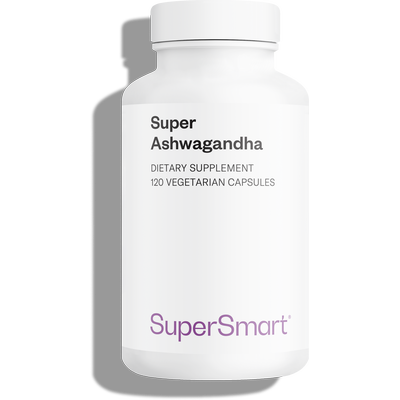Ashwagandha: a well-known plant from Ayurvedic medicine improves memory
 Do you have trouble remembering the dates of appointments? Do you feel as if you’re not as quick as you used to be? Do you spend ages trying to recall names or words?
Do you have trouble remembering the dates of appointments? Do you feel as if you’re not as quick as you used to be? Do you spend ages trying to recall names or words?
If you’ve answered ‘yes’ to any of these questions, you’ll definitely be interested in the conclusions of this new study: supplementing with ashwagandha, or Indian ginseng, a traditional plant that has been part of Ayurvedic medicine for more than 3000 years, improves cognitive function and boosts memory.
What exactly was the study showing these benefits for ashwagandha?
Fifty subjects aged over 35 took part in a double-blind clinical trial for 8 weeks. Half were given a capsule containing an extract of ashwagandha, twice daily with a little water, while the other half received a placebo, ie, with no active principle. Neither group knew which of the two they had been given.
The volunteers had previously undergone a series of cognitive tests which were then repeated after 8 weeks’ supplementation.
The researchers were thus able to compare the two groups’ cognitive performance before and after the experiment. And what they found was that those participants given the ashwagandha showed significant improvements in memory, logic, attention, executive function and speed of information-processing. We should say in passing that no conflict of interest was declared by the study’s authors.
This is not the first clinical research to show such results: several studies had already demonstrated ashwagandha’s potential for increasing cognitive performance and alleviating cognitive dysfunction (1) (2), particularly following neurological events such as brain injury, trauma or neurodegenerative diseases (3) (4).
So how can these cognitive benefits be explained?
A number of earlier studies have shown that ashwagandha root offers antioxidant, neuroprotective, anti-inflammatory, anti-depressant and anxiolytic effects (5).
But its effects on memory may be due to the ability of certain of its components to inhibit a specific enzyme called acetylcholinesterase (6), the role of which is to deactivate excitatory messengers in order to allow particular neurons to return to a state of rest. By preventing this deactivation, ashwagandha enables these neurons to remain active for longer (7), a potential benefit in diseases like Alzheimer’s in which neuron lifespan is shortened - especially as the neurons affected by acetylcholinesterase are those directly connected to memory …
Other studies have shown that ashwagandha has stress-fighting effects. These may be indirectly involved in improving cognitive mechanisms given that stress has been shown to adversely affect cognitive function (7-8), particularly attention.
So once again, we see conventional medicine confirming the importance of traditional knowledge: Indian ginseng has been used for more than 3000 years in Ayurvedic medicine for restoring strength and alertness.
Ashwagandha is treading the same path as extracts of Bacopa monnieri, Gingko biloba and Panax ginseng, all of which have been shown in clinical studies to be effective at improving cognition and symptoms of neurodegenerative diseases (9-12). As had already been indicated by practitioners of Ayurvedic medicine .
There are no real surprises here given that this traditional knowledge did not appear out of nowhere: it is built on a very long and collective experience, passed on from generation to generation – what is termed ‘empirical medicine’.
Ashwagandha is said to be an adaptogen plant because it significantly increases the body’s ability to adapt to stress factors and induces a stimulant effect on cognitive function (13). This effect has nothing at all to do with stimulants of the central nervous system such as caffeine, cocaine or nicotine which cause various degrees of psychological (and sometime physical) dependency.

If you plan on trying this natural supplement, be aware that the progress seen in this study was noted after eight weeks’ supplementation.
And if you too would like to measure ashwagandha’s efficacy this is entirely possible: you just need to complete some cognitive tests before you start taking the supplements and then repeat them after eight weeks’ supplementation (at 600mg a day, equivalent to 2 packs of Super Ashwagandha) so you can compare the results objectively.
You can find exercises that test different aspects of memory at websites such as Happyneuron.fr or in specialist books - take care to record the dates of your tests and your results.
Here are two examples of exercises that test your memory:
1) On a sheet of paper, draw a plan of your dining room, including all the permanent elements (windows, doors, furniture, objects). Don’t look at the room before doing the exercise and don’t draw the plan while you’re in it.
2) Spend 60 seconds carefully observing the following numbers and try to memorise them. Then look away from the screen and complete the following actions.

a) write down the numbers in ascending order
b) write down the numbers in descending order
c) write down the numbers in the order in which they appeared.
The study at the centre of this article:
Dnyanraj Choudhary, Sauvik Bhattacharyya & Sekhar Bose (2017) Efficacy and Safety of Ashwagandha (Withania somnifera (L.) Dunal) Root Extract in Improving Memory and Cognitive Functions, Journal of Dietary Supplements, 14:6, 599-612, DOI: 10.1080/19390211.2017.1284970

An organic Withania somnifera extract for mental health and relaxation
www.supersmart.comAll rights reserved
Free
Thank you for visiting our site. Before you go
REGISTER WITHClub SuperSmart
of exclusive benefits:
- Free: our weekly science-based newsletter "Nutranews"
- Special offers for club members only

















